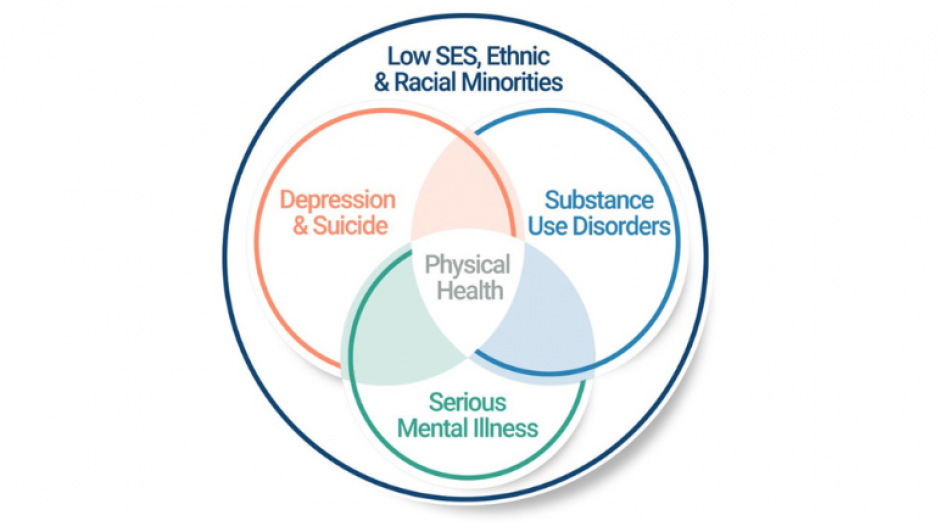Abstract:
There are not enough healthcare providers to meet the mental health needs of older adults, and older adults are far less likely to get mental health and substance use services than are younger adults. The SAMHSA-funded E4 Center of Excellence for Behavioral Health Disparities in Aging offers training opportunities to enhance knowledge, skills, and attitudes about aging, and increase implementation of evidence-based practice for older adults; provides tools and regional policy academies for building partnerships and sustaining an effective behavioral health practice so older adults don’t fall through the cracks in our fractured health system; and provides resources for older adults and families.
Key Words:
mental health, behavioral health, disparities, E4 Center of Excellence
As the number of older adults grows in the United States, so, too, does the need for healthcare services of all kinds, including mental health services. While rates of mental health disorders are lower for older adults than for younger adults, the impact of mental health disorders is greater for older adults. Thus, effective mental health service provision for older adults is critical. As in other healthcare domains, we will never have enough geriatric mental health specialists to meet the current need (see Buehler & Emery-Tiburcio, in this issue).
This presents a timely opportunity to engage and equip generalists in the foundational competencies to work with older adults so that skilled mental health care is accessible to all of us as we age. Recognizing this disparity and similar disparities for other groups, SAMHSA in 2021 funded Centers of Excellence (CoE) for Behavioral Health Disparities, which are focused on three key populations: LGBTQ, African Americans, and Aging. The E4 Center of Excellence for Behavioral Health Disparities in Aging is part of an increasing inclusion of aging at SAMHSA, including a collaborative grant with CMS to create a CoE for Behavioral Health in Nursing Facilities, grants requiring lifespan perspectives, and a new role at SAMHSA focusing on aging and disability.
E4 Center Goals
The Engage, Empower, and Educate for Equity (E4) Center of Excellence for Behavioral Health Disparities in Aging was funded at Rush University Medical Center in Chicago. Our mission is, as the name indicates, to engage, empower, and educate healthcare providers and community-based organizations to encourage equity in behavioral health for older adults and their families across the United States. As shown in Figure 1, below, we are focused on the three key areas of depression and suicide, substance use disorders, and serious mental illness (SMI), and where they overlap to create or exacerbate physical health disorders.
‘The E4 Center is focused on building knowledge, skills, and attitudes in the broadly defined mental health workforce.’
For some, these areas are layered on top of low socioeconomic status (SES) and minority status, which creates the most vulnerable population of older adults. To address these needs, the E4 Center is focused on building knowledge, skills, and attitudes in the broadly defined mental health workforce; working with health systems and the aging network to build partnerships to prevent older adults from falling through the cracks; providing training and technical assistance in evidence-based programs for older adult mental health and substance use; and, although we don’t train older adults and families directly at the E4 Center, providing resources to share that can equip the mental health workforce across the country.

Knowledge, Skills, and Attitudes
To enhance knowledge, skills, and attitudes about aging, we offer several virtual and in-person training opportunities.
- Our Learning Community, targeted at healthcare clinicians and students, offers monthly 90-minute webinars with free continuing education credits on topics covering how to meet the mental health and substance use needs of older adults.
- To address the need for basic competency among clinicians, we developed a Foundational Competencies in Older Adult Mental Health certificate program. This is a 16-hour online program with content areas consistent with older adult mental health competencies for psychology, social work, and psychiatry. This certificate program was developed for licensed clinicians with a minimum of a master’s degree. The content is freely available to any interested learner, however, and can be used to augment university curriculum. Continuing education credits are available for a small fee, and group discounts are available.
- In addition to the online program, we host a three-day in-person Foundational Competencies in Older Adult Mental Health program at Rush University. Each spring we invite 25 to 30 licensed clinicians from across the country to Chicago to participate in didactic lectures, discussion, interactive exercises, and simulated patient experiences. Travel stipends and free continuing education credits are offered.
- The E4 Center developed the 4Ms Behavioral Health framework, which augments the original 4Ms of an Age-Friendly Health System (What Matters, Medication, Mentation, and Mobility) to clarify the role of behavioral health providers in meeting the needs of older adults. This framework was pilot-tested in 2023 in three community mental health clinics and in 2024, will roll out more broadly.
- • The E4 Center developed and launched six educational modules for 988 and crisis call center workers to increase knowledge in older adult behavioral health. Topics covered include ageism, depression and anxiety, suicide risk, cognition, substance use, and common life issues. Continuing education credits are available for psychologists and social workers.
- Active Listening training was created and is delivered in partnership with the Health & Medicine Policy Research Group. This training is appropriate for direct care workers and anyone who wants to learn to listen effectively and respond empathically.
- Safe-HOME naloxone awareness training was created and is delivered by our partners at the University of Chicago College of Pharmacy. This virtual training about opioid safety and naloxone awareness is appropriate for any healthcare or direct services worker in the community.
Evidence-Based Programs
- Reframing Aging: Addressing ageism is a critical factor in older adult healthcare. Thus, the E4 Center partnered with the National Center to Reframe Aging to offer a six-part webinar series on Reframing Aging, as well as Reframing Aging facilitator training to E4 Center staff and partners. We also collaborated in creating the Quick Start Guide—Starting with WHY? to provide guidance on language about aging.
- Evidence-based interventions for older adult mental health and substance use have been highlighted in webinar series each year at the E4 Center, including CBT basics, CBT beyond basics, CBT for insomnia, interpersonal psychotherapy, and psychosocial interventions for older adults with SMI. Recordings of these training webinars are available in our webinar archive. Upcoming series include peer supporters working with older adults and older adult family systems.
Building Partnerships
Geriatrics is a team sport, so partnerships across healthcare, community-based organizations, and state entities are critical to build care quality. To facilitate these partnerships, the E4 Center has developed two toolkits and state and regional policy academies.
- Toolkits: In addition to the written documents described below, we offer webinars describing the highlights of each toolkit, available in our webinar archive. We are happy to offer technical assistance to any organization wishing to implement any or all of the recommendations described in these toolkits.
o Utilizing Cross-sector Partnerships to Reduce Behavioral Health Disparities in Older Adults reviews the landscape of potential partners in older adult behavioral healthcare, options for building and maintaining partnerships, the policy issues that can act as barriers and facilitators for this work, plus concrete examples of how partnerships can work well.
o Building and Sustaining Effective Behavioral Healthcare for Older Adults: Strategies and Considerations is a comprehensive review of critical issues in engaging older adults in behavioral healthcare, creating an environment of care, and facilitating effective financial plans to assure service sustainability.
- Policy Academies were developed and led by E4 Center Scientific Directors Drs. Steve Bartels and Fred Blow to bring together critical entities across states to identify and begin to solve problems older adults face regarding mental health and substance use. Thus far, the E4 Center has engaged four states and one region. Each policy academy has engaged state leaders, including mental health, substance use, aging, housing, transportation, Medicaid, universities, and others in a brief series of virtual and hybrid virtual/in-person sessions to identify each state’s unique challenges, clarify the issues at stake, and create a specific 1-year plan to begin to address one key issue. The E4 Center has provided technical assistance to maximize the likelihood of successful implementation. To create a policy academy in your state, or get involved in ongoing efforts, please contact the E4 Center at e4center@rush.edu.
Older Adult and Family Resources
The E4 Center also provides key resources for older adults and families.
- Our Speak Up to Reduce Stigma campaign was designed to give voice to older adults who have experienced mental health or substance use treatment via video, and decrease the stigma that is so prevalent in the current cohort of older adults.
- Our Community Resources page provides resources on a wide variety of topics related to older adult mental health and substance use.
Who We Are
The E4 Center is co-directed by Erin Emery-Tiburcio, PhD, ABPP, and Robyn Golden, LCSW, at Rush University Medical Center. Please see our About Us page to learn more about the whole team. Partner organizations include the Boston University School of Social Work Center for Aging & Disability Education & Research, Health & Medicine Policy Research Group, Gerontological Society of America, National Association of State Mental Health Program Directors, and University of Illinois at Chicago-College of Pharmacy.
Please visit the E4 Center website, and don’t hesitate to contact us at e4center@rush.edu with any questions or requests for technical assistance.
Erin E. Emery-Tiburcio, PhD, ABPP, is a professor at Rush University Medical Center in Chicago. She may be contacted at erin_emerytiburcio@rush.edu. Susan Buehler, PhD, is an assistant professor, also at Rush University Medical Center. Laura Donnan, LCSW, MPH, was the E4 Center program manager at Rush University Medical Center.
Photo credit: Shutterstock/Pawpixell.com













